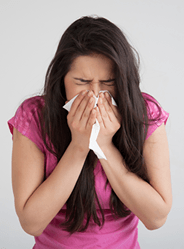Acupuncture Treatment - Serving West Chester, Mason, Montgomery, Fairfield, and Cincinnati
Allergy Relief With Acupuncture

According to WebMD, one in five Americans suffer from allergy symptoms at some point during the year. For some people, allergies are an inconvenience they must deal with for two or three weeks at the advent of spring. For others, allergies are a constant way of life, stretching their tentacles to affect everything the victims do and how they do them. The most common form of allergies, allergic rhinitis, inflames the nasal membrane when activated by external stimuli. This creates the usual symptoms everyone with allergies will recognize such as itchy eyes, hay fever, sneezing, and runny nose.
Of course, allergy medication is a big business in the U.S and around the world. Until its patent protection ran out in 2012, popular antihistamine Zyrtec was raking in $1.3 billion in yearly sales according to ABC news. While modern allergy medications have proven effective for many sufferers, they aren't without their problems. Many doctors report that their patients have trouble remembering to take their medicine on days when their allergy symptoms are mild. Forgotten doses can have a cumulative effect, leaving the patient without adequate protection for several days. Other common problems include the high cost of these treatments and their interaction with other medications.
Looking to Acupuncture
Many Americans dismiss acupuncture as something meant only for new-agey, Eastern-oriented people who eschew modern medicine for questionable reasons. If you are among those who would never dream of going to an acupuncturist for allergy relief, you may want to reconsider your stance. There is increasing evidence that the Chinese may have had it right all along.
Acupuncture Background
Unlike some homeopathic approaches to treatment, acupuncture has over 2500 years of successful use to back up its claims. Over that time, the volume of experience in the field has exponentially increased. This simply means that there is a lot of information out there on the subject if you care to look around for it. Most people think of Chinese healing when they hear the word acupuncture, but the practice is not limited to that part of the world or to that culture. Since the 1970s, acupuncture has been used around the world for treating a variety of aches, pains, and ailments.
Into the Modern Era
The last 20 years have seen an explosion in acupuncture research, not from natural health magazines and wizened philosophers, but from Western scientists. Clinical trials have been conducted with an effort on controlling for placebo and bunk acupuncture performed by unscrupulous "sham" clinics. While there is still much to learn about the ancient art, many of these studies have provided compelling evidence that acupuncture works in a variety of applications.
Even the World Health Organization is on record as saying acupuncture has been proven effective in treating headaches, hypertension, and a wide assortment of injuries and ailments. Contrary to popular belief, Eastern and Western medicine can coexist peacefully. As an example, there are currently more than 3,500 doctors in the U.S. who include acupuncture as part of their practices.
Acupuncture and Allergies
If you're not yet convinced that acupuncture can do anything for your allergy symptoms, prepare to have your mind changed. A number of recent studies have shown that acupuncture can be effective when used an a treatment for allergies. These studies include a 2008 Berlin trial where allergic rhinitis sufferers on an acupuncture treatment regimen reported a much higher quality of life after three months.
According to a 2013 study published in the Annals of Internal Medicine, acupuncture was able to create significant improvements in the study's participants after only eight weeks. Again, this study was centered around allergic rhinitis sufferers, and the results were measured by improvements in the participants' quality of life.
A small study published in the American Journal of Chinese Medicine found that acupuncture was able to reduce symptoms in 26 out of 26 participants, all of whom found relief without experiencing any negative side effects. These individuals, suffering from allergy-induced hay fever, found measurable relief after undergoing an acupuncture treatment.
Why Does It Work?
Scientists and doctors have seen enough evidence to conclude that there are measurable, statistically significant benefits to acupuncture. The exact method through which acupuncture works is still being uncovered with on-going research. In reference to allergies specifically, some doctors have theorized that acupuncture quiets the parts of the immune system that have been overstimulated by irritants in the atmosphere. Modern practitioners believe acupuncture points correlate to the body's nervous system, providing a way to directly stimulate nerves and muscles. This stimulation may be responsible for boosting natural immune functions while releasing endorphins, the body's natural painkiller.